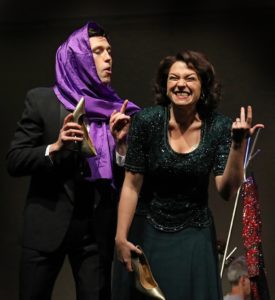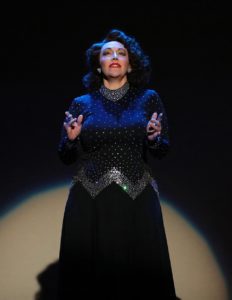Nashville Opera’s the Three Decembers
On November 9-11 Nashville Opera offered a production of Jake Heggie’s nostalgic Three Decembers at the Noah Liff Opera Center. Composed as a commission by the Houston Grand Opera in 2008, this intimate chamber opera, based on an original play by Terrence McNally which was set into libretto by Gene Scheer, visits with a small family over the course of three decades (1986, 1996, 2006) as they “struggle to connect and make sense of long-kept secrets that are revealed.”
Heggie’s work deals with the issues of the day (AIDS, alienation, and social judgement) from within the context of the timeless narrative of a parent’s sense of responsibility and guilt set against the child’s search for independence and meaning from the events of their lives. The opera is built on three characters, a Broadway actress and single mother Madeline Mitchell (Emily Pulley, mezzo-soprano), her daughter Beatrice (Cree Carrico, soprano) and her son Charlie (Robert Wesley Mason, baritone).
Each of the three acts hinges on Madeline’s yearly and borderline narcissistic “Christmas Letter” in which she treats of the recent events in her life. Her apparent lack of compassion for Charlie’s significant other, who is suffering from AIDs, is the primary dramatic contrast which pushes the plot forward. Mason’s voice, a strong and bright instrument, well expressed his naïve and idealistic character’s overly sensitive reactions to his mother’s weak efforts at compassion.

His sister, whose story comes closer to the fore in the second act, was played very well by Carrico. Her character’s somewhat ambiguous alcoholism and its cause (we find out in the third act that her husband has been adulterous) is an ingenious move on the part of Scheer, revealing in an opera of secrets, that hiding the problem can be worse than the problem itself. Carrico sang beautifully with a fluent diction and an attractive tone that humanized her character’s quick shifts in mood and temperament. To the mood shifts Carrico’s acting was fantastic, portraying her character’s “triggering” moments (Beatrice is a 20th century Rosina) with a believable and beautiful authenticity.
In the third act, Pulley ruled the stage and story. She brought the maternal gravitas that the role demands, and she sang with a warm and full-bodied instrument. A rich, sophisticated and complicated sound to match her character’s idiosyncrasies. The portrayal was extraordinary, expressing Madeline’s dignity, sometimes real, sometimes composed, and constantly maintained despite her errors, weaknesses and embarrassments. A woman in denial is a very difficult thing to portray, and Pulley accomplished it perfectly. In the third act, when her character transcends that denial, Pulley’s performance was revelatory.
Buried within the remarkable libretto to this story, each character goes through a journey of development, the  children realizing that the weaknesses and drawbacks they perceived in their mother were there of necessity just as they soon began to take on some of those very weaknesses themselves. This was accomplished very well in the acting, in Pam Lisenby’s costume design and in Sondra Nottingham’s subtle but expressive makeup design. In this, I think there is a small weakness in Heggie’s score. In the vocal lines beautiful melodies occur throughout the score. However, there is very little apparent development in the vocal line to reflect the aging and life experiences of these characters across the three-decade interval. Perhaps he chose to focus mainly on the synchronic expression in line, or maybe exemplify the idea that with our families we always fall back into the roles we’ve always played. Ultimately, from a dramatic and emotional standpoint, watching the ensemble numbers was the most difficult. The scenes abound with personal and painful attacks, the moments that mark the typical American holiday dinner, setting up for a latter intimate, if not complete, resolution. Maestro Williamson led the small orchestra from a keyboard with precision and a strong grasp of Heggie’s lines. In all it was another beautiful production from Nashville Opera, and we are looking forward to The Tales of Hoffmann in April.
children realizing that the weaknesses and drawbacks they perceived in their mother were there of necessity just as they soon began to take on some of those very weaknesses themselves. This was accomplished very well in the acting, in Pam Lisenby’s costume design and in Sondra Nottingham’s subtle but expressive makeup design. In this, I think there is a small weakness in Heggie’s score. In the vocal lines beautiful melodies occur throughout the score. However, there is very little apparent development in the vocal line to reflect the aging and life experiences of these characters across the three-decade interval. Perhaps he chose to focus mainly on the synchronic expression in line, or maybe exemplify the idea that with our families we always fall back into the roles we’ve always played. Ultimately, from a dramatic and emotional standpoint, watching the ensemble numbers was the most difficult. The scenes abound with personal and painful attacks, the moments that mark the typical American holiday dinner, setting up for a latter intimate, if not complete, resolution. Maestro Williamson led the small orchestra from a keyboard with precision and a strong grasp of Heggie’s lines. In all it was another beautiful production from Nashville Opera, and we are looking forward to The Tales of Hoffmann in April.




